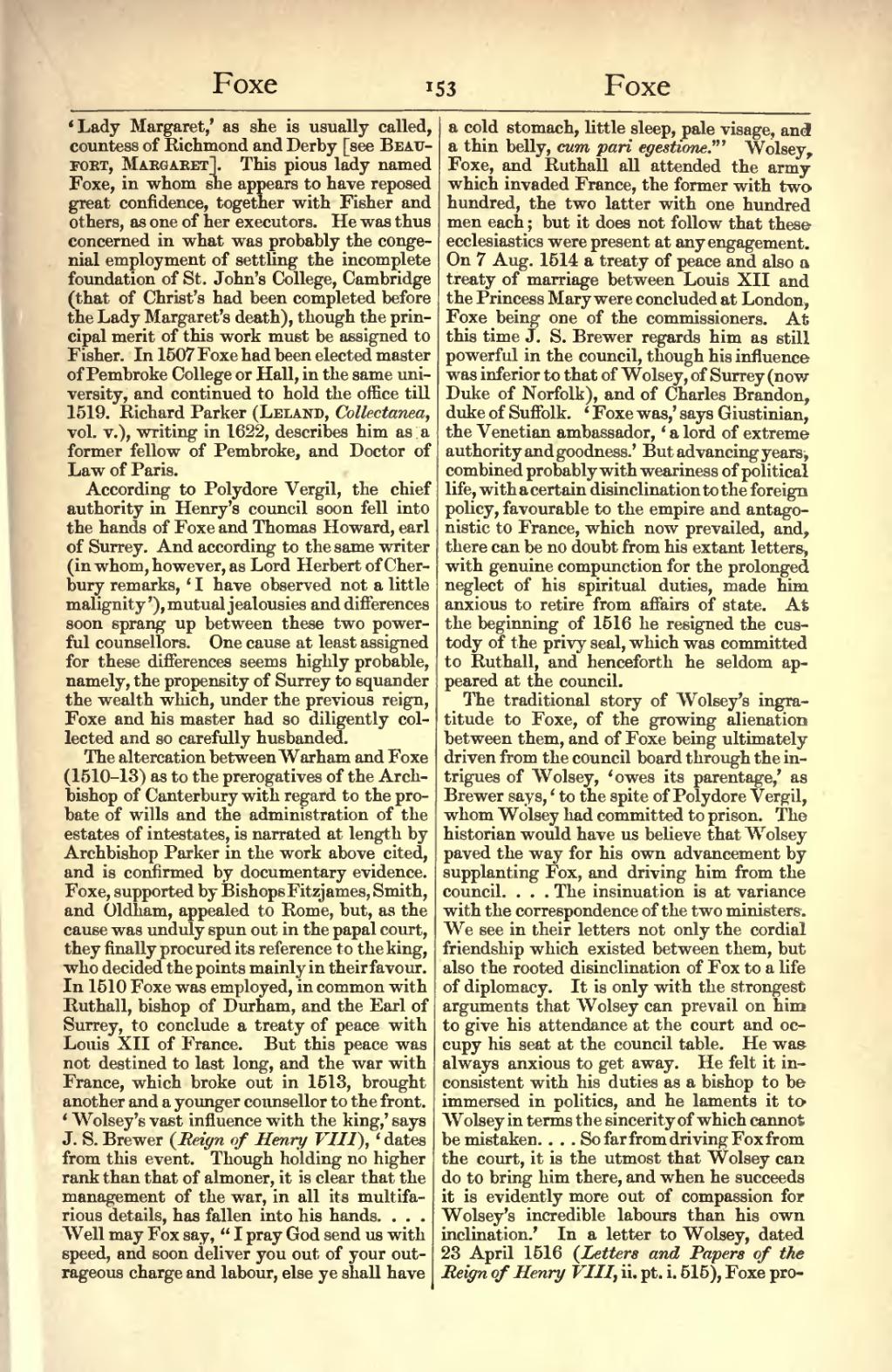‘Lady Margaret,’ as she is usually called, countess of Richmond and Derby [see Beaufort, Margaret]. This pious lady named Foxe, in whom she appears to have reposed great confidence, together with Fisher and others, as one of her executors. He was thus concerned in what was probably the congenial employment of settling the incomplete foundation of St. John's College, Cambridge (that of Christ's had been completed before the Lady Margaret's death), though the principal merit of this work must be assigned to Fisher. In 1507 Foxe had been elected master of Pembroke College or Hall, in the same university, and continued to hold the office till 1519. Richard Parker (Leland, Collectanea, vol. v.), writing in 1622, describes him as a former fellow of Pembroke, and Doctor of Law of Paris.
According to Polydore Vergil, the chief authority in Henry's council soon fell into the hands of Foxe and Thomas Howard, earl of Surrey. And according to the same writer (in whom, however, as Lord Herbert of Cherbury remarks, ‘I have observed not a little malignity’), mutual jealousies and differences soon sprang up between these two powerful counsellors. One cause at least assigned for these differences seems highly probable, namely, the propensity of Surrey to squander the wealth which, under the previous reign, Foxe and his master had so diligently collected and so carefully husbanded.
The altercation between Warham and Foxe (1510–13) as to the prerogatives of the Archbishop of Canterbury with regard to the probate of wills and the administration of the estates of intestates, is narrated at length by Archbishop Parker in the work above cited, and is confirmed by documentary evidence. Foxe, supported by Bishops Fitzjames, Smith, and Oldham, appealed to Rome, but, as the cause was unduly spun out in the papal court, they finally procured its reference to the king, who decided the points mainly in their favour. In 1510 Foxe was employed, in common with Ruthall, bishop of Durham, and the Earl of Surrey, to conclude a treaty of peace with Louis XII of France. But this peace was not destined to last long, and the war with France, which broke out in 1513, brought another and a younger counsellor to the front. ‘Wolsey's vast influence with the king,’ says J. S. Brewer (Reign of Henry VIII), ‘dates from this event. Though holding no higher rank than that of almoner, it is clear that the management of the war, in all its multifarious details, has fallen into his hands. … Well may Fox say, “I pray God send us with speed, and soon deliver you out of your outrageous charge and labour, else ye shall have a cold stomach, little sleep, pale visage, and a thin belly, cum pari egestione.”’ Wolsey, Foxe, and Ruthall all attended the army which invaded France, the former with two hundred, the two latter with one hundred men each; but it does not follow that these ecclesiastics were present at any engagement. On 7 Aug. 1514 a treaty of peace and also a treaty of marriage between Louis XII and the Princess Mary were concluded at London, Foxe being one of the commissioners. At this time J. S. Brewer regards him as still powerful in the council, though his influence was inferior to that of Wolsey, of Surrey (now Duke of Norfolk), and of Charles Brandon, duke of Suffolk. ‘Foxe was,’ says Giustinian, the Venetian ambassador, ‘a lord of extreme authority and goodness.’ But advancing years, combined probably with weariness of political life, with a certain disinclination to the foreign policy, favourable to the empire and antagonistic to France, which now prevailed, and, there can be no doubt from his extant letters, with genuine compunction for the prolonged neglect of his spiritual duties, made him anxious to retire from affairs of state. At the beginning of 1516 he resigned the custody of the privy seal, which was committed to Ruthall, and henceforth he seldom appeared at the council.
The traditional story of Wolsey's ingratitude to Foxe, of the growing alienation between them, and of Foxe being ultimately driven from the council board through the intrigues of Wolsey, ‘owes its parentage,’ as Brewer says, ‘to the spite of Polydore Vergil, whom Wolsey had committed to prison. The historian would have us believe that Wolsey paved the way for his own advancement by supplanting Fox, and driving him from the council. … The insinuation is at variance with the correspondence of the two ministers. We see in their letters not only the cordial friendship which existed between them, but also the rooted disinclination of Fox to a life of diplomacy. It is only with the strongest arguments that Wolsey can prevail on him to give his attendance at the court and occupy his seat at the council table. He was always anxious to get away. He felt it inconsistent with his duties as a bishop to be immersed in politics, and he laments it to Wolsey in terms the sincerity of which cannot be mistaken. … So far from driving Fox from the court, it is the utmost that Wolsey can do to bring him there, and when he succeeds it is evidently more out of compassion for Wolsey's incredible labours than his own inclination.’ In a letter to Wolsey, dated 23 April 1516 (Letters and Papers of the Reign of Henry VIII, ii. pt. i. 515), Foxe pro-
